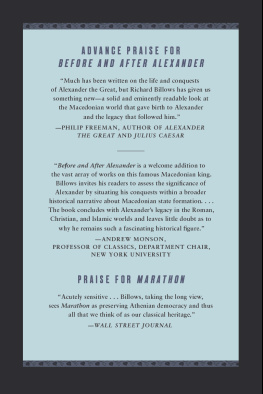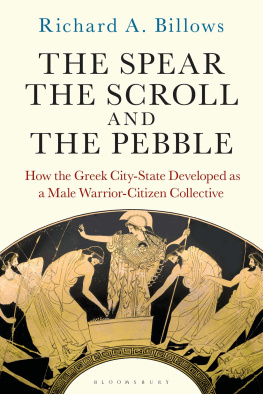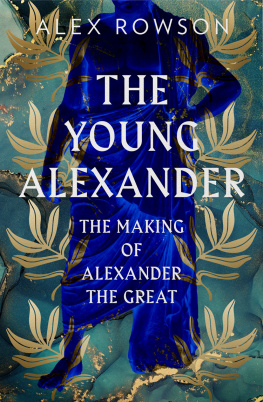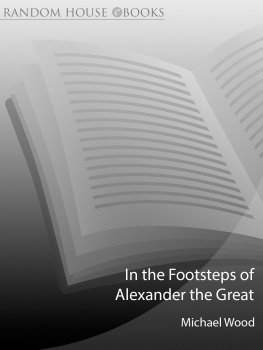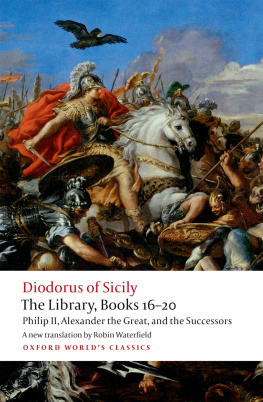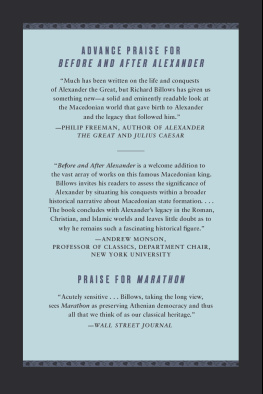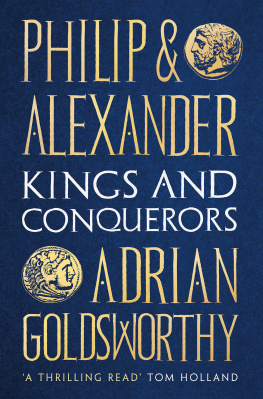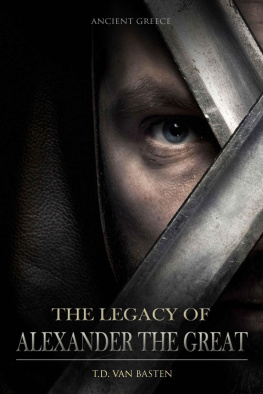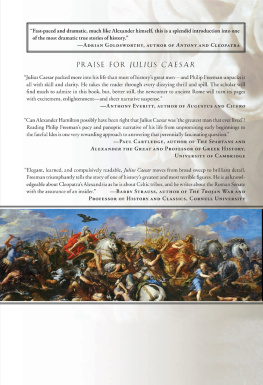This edition first published in hardcover in the United States in 2018 by
The Overlook Press, Peter Mayer Publishers, Inc.
NEW YORK
141 Wooster Street
New York, NY 10012
www.overlookpress.com
For bulk and special sales, please contact or write to us at the above address.
LONDON
30 Calvin Street
London E1 6NW
info@duckworth-publishers.co.uk
www.ducknet.co.uk
Copyright 2018 by Richard A. Billows
Maps by Roddy Murray, copyright 2018 The Overlook Press
All rights reserved. No part of this publication may be reproduced or transmitted in any form or by any means, electronic or mechanical, including photocopy, recording, or any information storage and retrieval system now known or to be invented, without permission in writing from the publisher, except by a reviewer who wishes to quote brief passages in connection with a review written for inclusion in a magazine, newspaper, or broadcast.
ISBN: 978-1-4683-1641-4
BEFORE & AFTER ALEXANDER
THE LEGEND AND LEGACY OF ALEXANDER THE GREAT
RICHARD A. BILLOWS
25 b&w images and 5 maps
I n the arc of western history, Ancient Greece is at the apex, owing to its grandeur, its culture, and an intellectual renaissance to rival that of Europe. So important is Greece to history that figures such as Plato and Socrates are still household names, and the works of Homer are regularly adapted into movies. The most famous figure of all, though, is Alexander the Great.
While historians have studied Alexanders achievements at length, author and professor Richard A. Billows delves deeper into the less studied periods before and after Alexanders reign. In Before and After Alexander, Billows explores the years preceding Alexander, who, without the foundation laid by his father, Philip II of Macedon, would not have had the resources or influence to develop one of the greatest empires in history. Alexander was groomed from a young age to succeed his father, and by the time Philip was assassinated in 336 BC, his great empire was already well underway.
The years following Alexanders death were even more momentous. In this ambitious new work, Richard Billows robustly challenges the notion that the political strife that followed was for lack of a leader as competent as Alexander, pointing out instead that there were too many extremely capable leaders who exploited the power vacuum created by Alexanders death to carve out kingdoms for themselves. Since Alexanders son and heir was a baby incapable of ruling, the temptation for the generals to operate on their own behalf was too great to pass up.
Above all, in Before and After Alexander, Billows eloquently and convincingly posits a complex view of one of the greatest empires in history, framing it not as the achievement of one man, but the culmination of several generations of aggressive expansion toward a unified purpose.
For Clare, at last
I N J UNE 323 BCE, IN A PALACE IN B ABYLON, A YOUNG MAN LAY DYING . Around his bed were a host of attendants, doctors, and generals, concerned about the imminent death of the ruler of their world. The young man was Alexander the Great, and though he was just thirty-two years old, he had already conquered one of the largest empires in history and made himself forever famous as one of historys greatest military leaders. For the generals gathered at his bedside, however, Alexanders death presented a huge problem: he had no clear successor. There was a vast empire to be organized and ruled, and no one knew how it was to be done or by whom. In the end, it took forty years of rivalry and warfare among Alexanders generals to sort out the succession to his power.
One hundred and fifty years later a new power, the young Roman state, began to expand into and take over the lands that Alexander had conquered and ruled so briefly, and they found in the eastern Mediterranean region a civilization based on the Greek language, Greek cities, and Greek culture, established there by the work of Alexanders Successors. That Greek-based civilization is known today as the Hellenistic civilization, and though taken over by the Romans it endured as the civilization of the eastern Mediterranean world for another five hundred years or so, until the triumph of Christianity and, eventually, Islam brought about radical changes. As the conqueror who made this great era of Hellenistic civilization possible, Alexander the Greats life, career, and achievements have been studied over and over by historians, giving rise to literally hundreds of books and probably thousands of detailed articles about the great conqueror. Much less studied, however, are the development of the Macedonian state and army under Alexanders father Philip II, which made Alexanders career possible, and the activities and policies of Alexanders Successors, which created the organizational framework in which Hellenistic civilization developed and flourished.
The aim of this book is, first, to offer a detailed study of the career of Philip II (to the throne was a disorganized and disunited backwater, peripheral to the local great powers of Athens, Sparta, and Persia. Philip II built up an entirely new type of army with a new style of warfare, and through this army united Macedonia, expanded its borders, and turned it into the greatest power in the ancient world by his death at the age of forty-seven, assassinated by a disgruntled officer in his own bodyguard. It was the state and army built by Philip that provided Alexander with the tools to undertake his career of conquest.
After a relatively brief review of Alexanders conquests ().
This book thus covers a topic of enormous interest and importance to the history of western civilization, that of the establishment of Greek culture as a universal culture from the rivers of Iraq to the Adriatic Sea, and from the Black and Caspian Seas to the deserts of Arabia and the border of the Sudan. Everywhere within this vast and diverse territory, between 300 BCE and 300 CE (and later) there were to be found Greek cities with Greek citizens, speaking and reading the Greek language, and living their lives according to the social, cultural, and political patterns established in Classical Greece in the sixth, fifth, and fourth centuries BCE. This remarkable civilization left, as is well known, a rich cultural heritage that has deeply influenced western (and indeed Muslim) culture and civilization ever since. It is as the facilitators who made possible this spread of Greek culture, and its establishment throughout the eastern Mediterranean and western Asia as the dominant culture, that Philip II of Macedonia, his son Alexander, and Alexanders Successors remain an important and fascinating topic of study.
MAP 1: Greece - 5th century

MAP 2: Macadonia

MAP 3: Alexander

MAP 4: Diadoche

MAP 5: Helenistic


